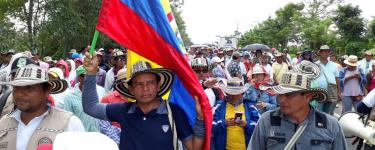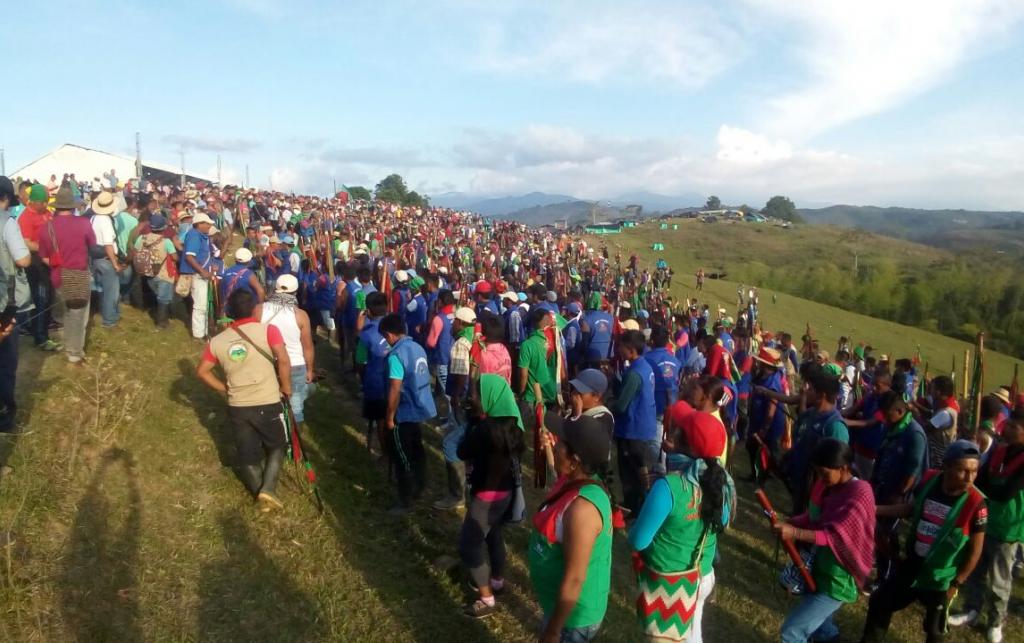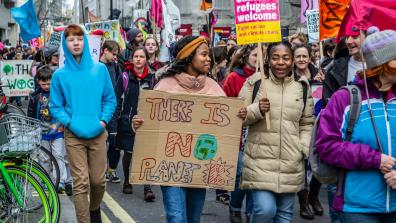Santos receives awards in UK while repression continues in Colombia

President Santos of Colombia has travelled to the UK to receive two international awards from Chatham House and Kew Gardens. However, while Santos is being awarded with these prizes, communities in Colombia are currently engaged in an intense period of protests, which began 12 days ago. The protests were organised to denounce the systematic targeting and killing of social leaders; the lack of protections for the environment and territories; and the countless agreements which the government hasn’t complied with or upheld.
These communities have been met with violent repression from ESMAD - Colombia’s police unit specialising in controlling public disturbance. The response speaks for itself: 44 people have been injured, 3 seriously and 19 people have been threatened.
Why the prizes?
Chatham house is awarding Santos for his contribution to international relations through his involvement in brokering the peace accords between the FARC guerrilla and the Colombian state. Kew Gardens is awarding him with the Kew International Medal, “for opening the country to international collaboration in biodiversity research”, made possible, they say, through the promotion of peace accords, which were signed in November 2016.
Santos’ record on human rights and the environment is questionable to say the least; social movements and local organisations would argue it is criminal. For Santos to be receiving these awards is beyond cynical, what these two prizes represent is a clear message of contempt by the UK establishment, which is more interested in reaping the benefits of the continued extraction and exploitation from Colombia’s natural wealth and labour, than promoting respect for human rights, the environment and long-lasting peace.
Month of Indignation
In stark contrast, on October 30 hundreds of thousands of indigenous, Afro-descendant, peasant and urban communities began a national mobilization for an indefinite period: the Minga for Life, Territory, Peace and Compliance with the Agreement. Communities from over eight regions have taken to the streets, blocking many of them to demand that the Peace Agreement signed in November 2016, which ended the 50-year conflict between the government and the FARC insurgency, is upheld and respected. Especially the chapter related to indigenous and Afro-descendant communities.
The document put forward by the protesting indigenous organisations says:
“We continue to strive for a complete and stable peace, which is inclusive. However, it is sad and concerning that despite the peace agreements and the ceasefire, the violence hasn’t stopped. Indigenous people, peasants, Afros, and other popular leaders continue to be killed and the impunity grows”.
The different organisations who organised the protests are currently sat down at the table with the government seeking to come to another agreement and hoping the government will comply with this one.
Our partner Marylen Serna Salinas of Congreso de los Pueblos talks about the month of indignation.
The current wave of protests, are part of the Month of Indignation, which has seen diverse sectors up and down the country taking action to raise awareness about the multiple crises facing Colombia since the signing of the agreements with the FARC.
Colombia is one of the world’s most dangerous places for environmental defenders. In 2015, 26 leaders were murdered; 37 were murdered in 2016 and so far this year, 22 defenders have been murdered. It seems as though the peace process has only served to exacerbate the violence to those who defend life, water and life against destructive industries.
Santos’ contribution to peace and biodiversity
One of Santos’ principal neo-liberal strategies since his election in 2010, has been the promotion of the shamelessly named ‘mining locomotive’, a policy centered on the extraction of natural resources – coal, silver, gold and other minerals – and on large-scale agribusiness for global markets. The policy places the interests of foreign investors and extractive industries above the rights of communities and their territories. The negotiations leading up to the peace agreements were underpinned by Santos’ early condition that the development model, “was not up for discussion.”
Apart from the environmental destruction caused by these projects, the livelihoods, economies, traditions and customs of communities are transformed, displaced and disappeared – often violently - as the ‘mining locomotive’ sweeps away traditional forms of agriculture and land use and replaces it with industry dependent economies and weak regulations or standards.
However, indigenous, Afro-descendant and peasant communities are fighting back. This year, a number of communities have employed a constitutional mechanism – Popular Consultations – which allows communities to decide whether to allow large-scale mining and oil projects in their municipalities. A wave of popular consultations of this type has swept the country and over 40 communities have participated in processes resisting the extraction with a resounding NO. The process has been heavily challenged by various sectors of the Colombian political class and elites, who are doing everything they can to delegitimise these exercises in popular democracy.

Our friends at Colombia Solidarity Campaign sent the following letter to Santos, the Nobel Peace Prize winner: http://colombiasolidarity.org.uk/urgent-actions/640-letter-to-the-holder-of-the-nobel-peace-prize
War on Want stands in solidarity with our partners and with all of the popular sectors currently engaged in mobilisations in Colombia and demands that their rights be protected, and that the government complies with the agreements it has signed previously. We will remain vigilant




